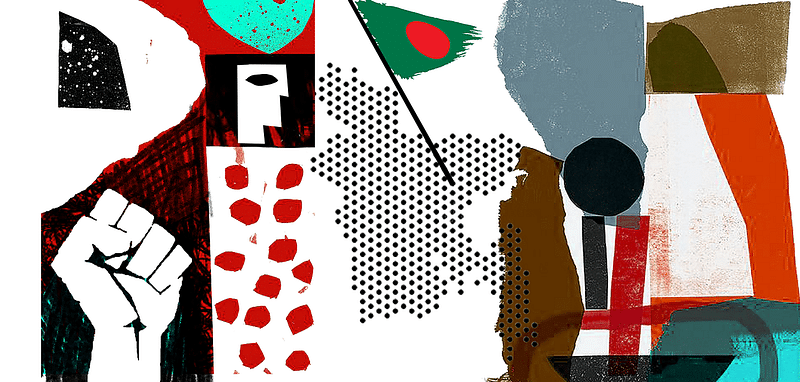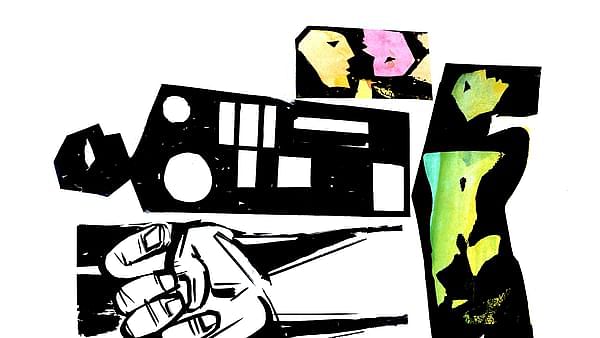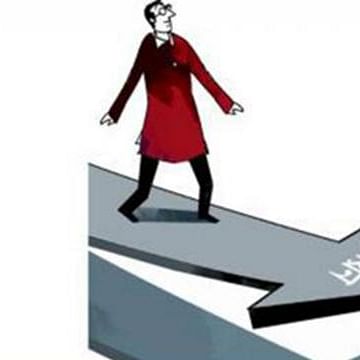
On the momentous occasion of Bangladesh’s golden jubilee of independence, the narrative of the country’s economic success that is being reiterated repeatedly, is its GDP growth. The reason why we have been hearing this same story over the past few years is that those at the helm are eager to show that, despite the lackings in good governance and democracy, there has been ‘development’. Development and growth have become synonymous. It is undeniable that Bangladesh’s economy has seen significant growth over the past couple of decades.
Changes in the economic structure have made important contributions to this growth. Prior to independence and in the decade following independence, Bangladesh’s economy basically depended on agriculture. Now it is not agriculture, but industry and services that are the driving forces of the country’s economy. The major contribution to the economy comes from the remittance sent in from overseas and the export of readymade garments.
Bangladesh is now the second highest exporter of readymade garments in the world. And the readymade garment sector provides the highest employment in the country. Of the four million workers in the sector, three million are women. In 1979, the net annual earnings from the readymade garment sector was only USD 40,000. In 2019 this stood at USD 34.13 billion. But we must not forget the sacrifice, the low wages and the unsafe working conditions of the innumerable workers in the sector. Certain fatal incidents, particularly the Rana Plaza collapse which killed 1,200 workers and injured over 2,500, led to renowned international brands adopting two initiatives to monitor the work environment.
Bangladesh’s economic growth according to the GDP rate has been restricted to a small section of the society. This growth has not been able to halt millions of poor people to slide into further poverty
According to official records, since the onset of democratic rule in Bangladesh, the GDP rate has annually increased by five per cent to six per cent. In the 2017-18 fiscal this was 7.8 per cent and in the 2019-20 fiscal it was 7.3 per cent. This means Bangladesh is the fifth fastest growing economy in the world. However, various research organisations are dubious about these official figures as these do not tally with sector-wise calculations.
Also Read
Bangladesh emerges important in geopolitics

Over the past few decades, Bangladesh has seen considerable improvements in the human development index, particularly in poverty alleviation, a low infant and maternal mortality rate, sanitation and female education. It is not just the state that has contributed to this continued development. The continuity of various government policies, development NGO’s, private enterprise and the innovative force of the people, have also contributed to this development. The advancement in these indicators are evidence of integrated success. But the outbreak of coronavirus over the past year has thrust all these into the face of challenge. Poverty has risen and a large section of the population is struggling with their lives and livelihood.
Bangladesh’s social and economic successes have astonished many economists and development workers. Despite a low quality of governance, a high density of population, lack of natural resources, lack of institutional structure, frequent natural disasters and political unrest, Bangladesh has seen economic and social development. Many refer to this as the ‘Bangladesh paradox.’ The World Bank and IMF particularly use Bangladesh as their development poster child. However, the economic disparity and the abnormal rise of the wealthy class behind this relative development, hardly comes up in discussion. As the country’s economic growth increases, the income of the poor section of people and their resources decrease. In the country, 46 per cent of the children face multidimensional poverty.
The correct use of its geopolitical situation can make Bangladesh an important country in the future, but that depends on the establishment of democratic political stability and an astute foreign policy. Is Bangladesh headed in that direction?
According to a recent report of the United Nations, one in every six persons of Bangladesh is subject to malnutrition. On the other hand, in the 2019 report of the New York-based research institution Wealth-X, Bangladesh ranked third in the world’s 10 fastest rich population. Such an economic system has been created where it has become normal for those linked with the political powers to loot public resources.
Also Read
Backtracking on the aspirations for democracy

Globalisation has accelerated this trend. Technological innovations, particularly the use of the internet, has easily brought globally popular culture, food habits and lifestyles to the people of Bangladesh. Cheap smartphones and internet connections have given a section of society access to the flow of information. According to BTRC, in December 2020, the number of internet users in Bangladesh was around 110 million. In January 2020, according to records, the number of mobile phone connections was over 160 million. And the number of social media users was 36 million. The government projects these figures to claim they have created ‘Digital Bangladesh.’ But in South Asia, only Afghanistan has slower internet speed than Bangladesh. Bangladesh’s internet speed is even slower than that of Ethiopia and Somalia.
Also Read
A return of religion to politics

The fusion of global and local culture and values is not unilateral. Alongside the influence of western culture, technology has also extended influence into religious culture too. Despite the inevitable changes, it is also a fact in the case of social transformations in Bangladesh, there the poor and rich gap, the rural and urban differences and the digital divide.
Bangladesh has gone through all sorts of transformations over the past 50 years. Despite the inadequacy of resources, the lack of infrastructure and the high density of population, the people’s survival abilities have brought success to the country. The country that was once almost unknown in the international arena, now has the largest contribution to UN peacekeeping. The Grameen Bank development model of microcredit, which won Bangladesh its first Nobel Prize, is now changing the lives of millions around the world. Bangladesh is also the home of the world’s largest NGO, BRAC. This unprecedented development of the economy and human resources is being tarnished by the deterioration of democracy, violation of human rights and the curbing of political rights. Instead of consolidating democracy and strengthening the state institutions, in recent times the basic elements of pillars of democracy in Bangladesh are being violated, taking it backwards instead of ahead.
Also Read
Bangladesh, GDP and corruption go hand in hand

On the 50th anniversary of independence, the questions have arisen – will Bangladesh’s development be sustainable in the days to come? Will the state institutions be strengthened and citizens’ rights be ensured? Or will Bangladesh become a totally authoritarian country? Rather than just on the basis of growth, will disparity end and a participatory economy emerge? The correct use of its geopolitical situation can make Bangladesh an important country in the future, but that depends on the establishment of democratic political stability and an astute foreign policy. Is Bangladesh headed in that direction?
* Ali Riaz is a distinguished professor at the Illinois State University in the US, a nonresident senior fellow of the Atlantic Council and the president of the American Institute of Bangladesh Studies.
* Saimum Parvez is a teacher at North South University’s department of political science and sociology. He recently earned his doctorate degree from the University of Sydney. He carries out research on terrorism, digital media and Bangladesh politics.
* This column appeared in the print edition of Prothom Alo and has been rewritten for the English edition by Ayesha Kabir









